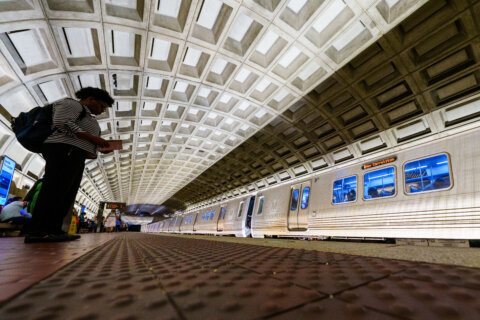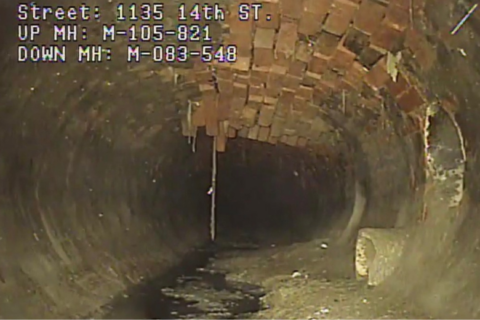The D.C. agency tasked with analyzing crime scene evidence now faces a daunting backlog of cases after having its accreditation to perform some forensic casework restored late last year.
Meanwhile, leaders of the D.C. Department of Forensic Sciences are caught in a public dispute with former members of an independent panel that advises the lab on best scientific practices over transparency concerns — which has resulted in ethics complaints and a referral to the D.C. Office of the Inspector General.
Both developments were on display at a D.C. Council Public Safety and Judiciary Committee hearing last week.
Council member Brooke Pinto, who chairs the committee, began the hearing offering praise for interim DFS Director Dr. Francisco Diaz and the agency for the successful reaccreditation of two of the lab’s several units late last year — the lab’s Forensic Biology Unit, which tests DNA evidence, and Forensic Chemistry Unit, which tests seized drugs.
She called it “incredible hard work and good work that went into taking this important step forward for DFS.”
Diaz said the accreditation board that gave the agency its seal of approval after an on-site assessment, found zero non-conformities, or issues needing to be corrected.
In April 2021, ANAB, the American National Standards Institute’s accrediting board, withdrew the lab’s accreditation to perform all forensic testing, after a scathing report concluded the lab’s Firearms Examination Unit erroneously linked shell casings from two different 2015 crime scenes to the same gun and lab managers then concealed the conflicting findings.
‘Serious backlog’
The District is facing a historic 20-year high in homicides and other crimes, and the sidelined crime lab has been cited as a key factor for why fewer crimes are being prosecuted.
While the lab has been spending millions of dollars to ship evidence to outside labs, Pinto said a “serious backlog” has built up since 2021, including in the number of DNA profiles that have yet to be uploaded into the national CODIS database run by the FBI.
The CODIS database is a key tool for investigators — a “hit” in the system when a new profile is uploaded can help zero in on a previously unknown suspect or link crimes that were not previously known to be connected.
According to data provided to the D.C. Council, the District is now sitting on 1,176 DNA profiles taken from crime scene evidence that have yet to be uploaded into CODIS.
That’s nearly double the 650 DNA profiles that were waiting to be uploaded into CODIS around this time last year.
D.C. has been hampered by the fact that, although the lab has been outsourcing DNA analysis work to private labs, only public, government-run labs are cleared to input profiles into the CODIS database. Since 2021, D.C. has worked with state labs in Connecticut and Wyoming to input some of the District’s DNA profiles into the database. But even with that workaround, far fewer samples are uploaded into the database.
In data provided to the D.C. council, the agency didn’t say how many total DNA profiles were uploaded to the system in the past year. However, the data does include the number of CODIS “hits” that were generated.
In fiscal 2023, just 59 CODIS hits were generated. That’s up from the 42 hits in fiscal 2022, but far below the 257 hits generated in 2020 — before the agency was forced to halt casework.
Former adviser says agency’s actions eroded trust
Meanwhile, the agency is grappling with allegations from a former member of the Science Advisory Board that agency leaders routinely kept information from members of the independent panel of experts who are supposed to advise the agency on best practices.
In public testimony at the oversight hearing, Rick Tontarski, a former member of the board, pointed to a pattern of “DFS behaviors that confound the SAB members and create the impression that DFS has information that it does not want to disclose or discuss in public.”
He added: “Any single item could be a misunderstanding. Taken collectively, DFS’ actions built distrust.”
For example, Tontarski said DFS leadership set all meeting agendas and required the agency director to approve what board members could discuss. Agency leaders “choreographed the meetings” and provided information “strong on generalities and light on specifics,” Tontarski said.
By law, the panel is supposed to review the agency’s scientific practices and protocols.
Tontarski said that didn’t happen.
Tensions between the board and agency leadership apparently ratcheted up during a board meeting in October when a board meeting was abruptly halted by DFS leadership, according to meeting minutes posted online.
Video of the October meeting has still not been posted on the DFS website. The agency blamed “technical issues,” according to The Washington City Paper, which reported on the tug-of-war between the agency and the board in November.
Matter referred to the DC Inspector General
Tontarski said he and his former colleagues filed a complaint with the Board of Ethics and Government Accountability over the halted meeting as well as the lack of video.
The complaint has been referred to the D.C. Office of the Inspector General for review, according to the Director of Open Government Director Niquelle Allen.
“The allegations you raise concerning the agency’s interference with the SAB’s meetings … show a possible abuse of position by DFS personnel,” Allen wrote in her referral letter.
Testifying before the committee last week, Diaz maintained that the October meeting was halted because the board was in violation of the Open Meetings Act.
He added that other unspecified ethics complaints against board members have been turned over to the board of ethics.
Diaz who was named interim director of the agency in May, said board members’ claims are “unfair” to him.
“I have worked in forensic pathology and forensic sciences in the United States for 30 years, basically, to the day,” Diaz said. “And I think the record that I produce speaks for itself.”
On the relationship between agency leadership and the board, Diaz commented, “I think it’s sad. I think it’s unfortunate. I think there’s been miscommunications, misunderstandings.”
What’s next?
Lab officials said they have a “robust plan” to work through the DNA backlog in about six months — but are still waiting on the FBI to give a final OK to use the system.
Dr. Jennifer Love, the department’s newly appointed chief science officer, said that approval was expected within no more than a week or two.
Love said the plan for culling the backlog calls for the agency to continue outsourcing DNA analysis work for new cases to private labs, while a number of the lab’s own DNA analysts work on reducing the CODIS backlog.
Some in-house staff will work on processing sexual assault kits and analyzing DNA from fired cartridge casings — which could tell investigators who loaded the bullets that fired a gun used in a particular crime. Love said DFS was recently cleared to perform that type of analysis, which is expensive to outsource.
She also said federal funding would be used to help drive down the backlog.
While the DNA and drug unit have been cleared to perform forensic casework, there are still units in the lab that are sidelined.
There are still no immediate plans to bring back a Firearms Examination Unit, which was disbanded in September 2021.
Meanwhile, Diaz said the plan is to seek reaccreditation for a Latent Fingerprint Unit by the end of the year.
Less publicized than the errors in the firearms unit, a 2021 internal audit in the fingerprint unit found that in 42 of the 45 cases analyzed, prints were improperly evaluated. In late 2022, the agency informed members of the D.C. Council that a majority of the eight-person unit had failed proficiency exams.
In documents prepared for the committee this month, the agency wrote that the fingerprint unit “is currently amid a complete overhaul of their methods and procedures.”
Get breaking news and daily headlines delivered to your email inbox by signing up here.
© 2024 WTOP. All Rights Reserved. This website is not intended for users located within the European Economic Area.








